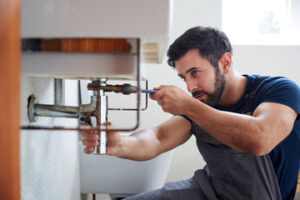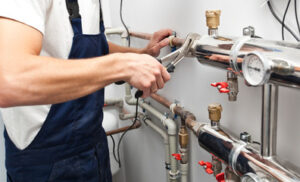Plumber Rosenberg TX works with piping systems that distribute water, drain waste, and convey heating and cooling materials. They install and repair these systems in residential, commercial, and industrial settings.

Many people choose to become plumbers because of the lucrative pay and opportunities for advancement. They also enjoy a recession-proof career as people will always need water and sewage services.
The job duties of a plumber include installing, repairing, and replacing plumbing fixtures and systems. They also inspect and maintain plumbing systems to ensure that they are in working order. Plumbers must be familiar with the rules and regulations for plumbing in their jurisdiction. In addition, they must be able to read and interpret blueprints. They must also be comfortable using a variety of tools and equipment. Plumbers must also be able to provide accurate estimates for their work.
Plumbers install, repair and replace piping systems for water, gas, storm sewers, waste, steam, and air. They may also repair and install domestic appliances such as refrigerators, dishwashers, washing machines, and dryers. They must also be able to perform backflow testing and inspections. They often work with various chemicals, solvents, and cleaners that can be hazardous to your health if not used properly. Therefore, it is important to follow all instructions for mixing, handling, and disposing of these chemicals.
Some of the other responsibilities of plumbers include interpreting building plans, blueprints, and sketches to determine the routing, placement, fall, and connections for piping. They also prepare and mark piping, layout ductwork, and supports for a wide variety of installations. Plumbers also inspect plumbing systems and equipment to detect and locate problems. They may dismantle devices or hoses, and measure, cut, and bend pipe to fit into place.
Plumbers must be able to work well under pressure and be able to solve complex problems. They must be able to think quickly and work well with others. They must have good written and verbal communication skills and a polite demeanor. They must be able to explain technical issues in a way that customers can understand.
Other responsibilities of plumbers include keeping track of all repairs and maintenance completed, as well as the materials and supplies needed for each job. They must also keep records of all interactions with customers and any other relevant information. Plumbers must be able to work a varied schedule, including after-hours emergency call outs. They must also be able to climb stairs and ladders, and be able to lift heavy objects.
Education and Training Requirements
Getting the right education is essential to starting a career as a plumber. This includes earning a high school diploma or passing a General Educational Development (GED) test. Once you have this qualification, you can pursue a program at a vocational school or community college that offers courses in plumbing technology. These programs can provide both classroom and hands-on training to help you build the necessary skills for your new career.
Another option is to find a formal apprenticeship. This can take a few years to complete and requires you to work under the guidance of experienced plumbers. Many apprenticeships also allow you to join a union, which can help boost your job opportunities in the field.
In addition to completing your apprentice training, you must obtain the proper licenses for your state. These requirements vary widely by state, but you can expect to pass an exam that tests your knowledge of piping regulations and safety rules. You may also need to complete advanced certifications to improve your skills and gain credibility in the industry.
While pursuing an apprenticeship is the best way to get the hands-on experience you need to begin your career as a plumber, you can also take online classes or attend workshops to expand your skillset. These learning experiences are a great way to stay current on the latest developments in plumbing technology and practices. You can even earn continuing education credits to keep your license valid.
To be a plumber, you must have strong communication and customer service skills. You will be interacting with customers to understand their needs and provide recommendations, so you need to be able to convey information clearly in both written and verbal form. You will also need sufficient physical strength and dexterity to handle the heavy demands of this trade. You may need to bend, squat and lift for extended periods of time to perform your duties, so it is important that you wear the appropriate safety equipment. A positive attitude and professional appearance are also key attributes for this job. In addition, a plumber should be familiar with the tools and materials needed for each project.
Work Environment
Plumbers work in a variety of environments, from residential to commercial and industrial settings. In addition, they have the option to work as independent contractors or start their own plumbing business. This provides flexibility and control over income, working hours, and project selection.
Plumbers often install and repair large-scale piping systems that carry water, wastewater, steam, and air to and from buildings. They may also work on heating and cooling systems, and fire sprinklers. They must be able to read blueprints and other documents to determine the location of pipes and equipment before installing them. They must also have the physical stamina to perform physically demanding tasks, such as climbing ladders and crawling into tight spaces.
Service and repair plumbers respond to calls from residential, commercial, and industrial clients to fix issues such as leaks, clogs, and broken fixtures. They use their problem-solving skills to quickly and accurately assess the situation and perform necessary repairs. They must be able to effectively communicate with customers to understand their needs and answer questions.
Some plumbers specialize in particular areas, such as green plumbing. These professionals help their clients conserve water and reduce energy usage, which benefits the environment as well as the client’s wallet. Green plumbers may also be involved in converting existing plumbing systems to more efficient alternatives.
A career as a plumber can be rewarding and exciting. The demand for this trade is consistently high, so job stability and opportunities for advancement are available. However, the work can be physically demanding and expose plumbers to hazardous materials. As such, it is important for potential candidates to fully consider the demands of the profession and make sure they are suited for it before applying. Those who are considering becoming a plumber should have technical expertise, strong communication and interpersonal skills, and physical stamina. They should also be able to comply with local and national building codes and safety regulations. Finally, it is important for plumbers to stay current on the latest technologies and techniques in their field. This will help them maintain their competitive edge and offer their clients the best possible services.
Salary
Plumbers are responsible for installing, repairing and maintaining the pipes and sewage infrastructure that keeps modern society running smoothly. This skilled trade offers a steady job market, excellent earning potential and flexible hours.
Plumbers can find work in many settings, including residential, commercial, industrial and government projects. Some specialize in particular areas like water heater installation, sewer systems or backflow prevention. Others may choose to become certified in green plumbing technologies, which help reduce water consumption and ensure proper system function. With experience, plumbers can also advance into supervisory roles or even start their own businesses.
Residential plumbers focus on piping and fixtures in homes and apartments, including sinks, toilets, bathtubs and showers. They may also install and repair appliances such as dishwashers and washing machines. Plumbers who work in commercial and industrial environments deal with larger-scale plumbing systems of office buildings, restaurants and factories. They are often required to weld, braze or solder these larger systems.
The average salary for plumbers varies depending on their specialty and level of experience. Apprentices make around $36,700 per year, journeymen make about $59,880, and master plumbers can earn up to $99,920. In addition, the cost of materials and tools can add up to an additional $10,000 or more to a plumber’s annual earnings.
Other factors that influence salary include whether a plumber is unionized, which can boost their earnings by 10-20% above non-union rates, and whether they take on extra training and certifications to improve their skills. Combining plumbing with HVAC skills lifts pay, as does specializing in backflow prevention and pipe welding.
Plumbers can expect to work overtime and on weekends, as they are often needed for emergency repairs. This can put a strain on family life, especially if the plumber is a parent or caretaker. However, being a plumber can be very rewarding for those who enjoy working with their hands and providing an essential service to the community. It can also provide a good income with flexibility in scheduling and the option to run one’s own business. It is important for those interested in this profession to have the right personality and aptitude for the work.
